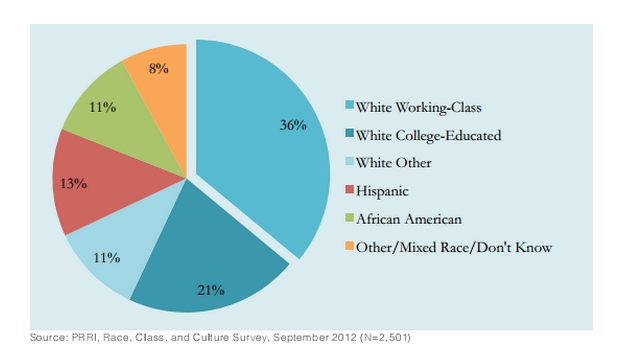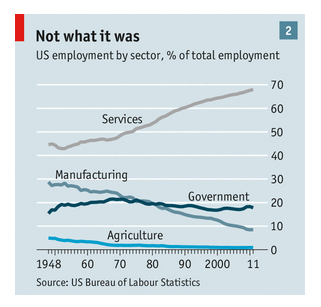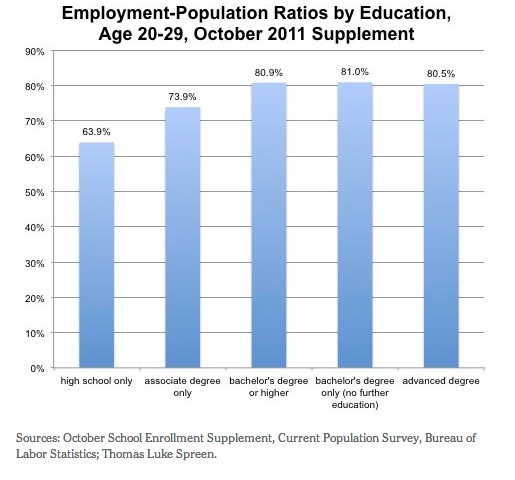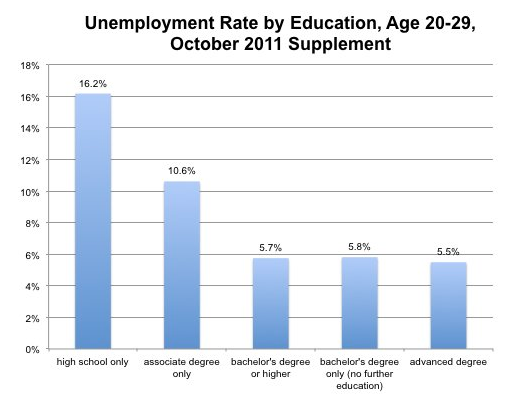There is no group in America on a steeper downward trajectory economically — not blacks, not Hispanics, not women. The roots of the decline are in economics, but a lot of damage was caused by party politics. The Republican party was neglectful, but the Democratic party was actively hostile: supporting programs to aid and empower other previously disenfranchised and impoverished groups — almost everyone except the white working-class, and an anti-jobs agenda.
The white working class, from here onwards simply WWC, is white people without a college education. That’s a lot of people: close to half of white men and more than a third of white women in the labor force, or 36% of the total US population. The following chart shows a September 2012 breakdown of the US population.

50 years of decline
By most indicators, over the last 50 years the white working class fared worse than any other US demographic. According to a Brookings Institution study: ‘each indicator that can be used to define the white working class, whether applied broadly or narrowly, shows huge declines from the World War II era to today—declines roughly in the 30-50 percentage point range.‘ The problems show up most clearly in employment statistics. The WWC made its home in manufacturing, and manufacturing employment has shrunk in the US. According to The Economist: ‘The share of American employment in manufacturing has declined sharply since the 1950s, from almost 30% to less than 10%.’ The following chart from The Economist shows this decline against other sectors in the US economy.

The WWC are workers without a college education, and there are less options today in the US economy for workers at that level. In this chart from The New York Times you see that the highest rate of employment is for workers with four-year college degrees.

Looking at it another way, unemployment is highest for workers with only high school degrees. See this chart, also from The New York Times.

Why?
The most obvious explanation for WWC losses is in economics: automation and globalization reduced the competitiveness of well-paid American industrial workers; but the WWC is also a victim of party politics. They’re neglected by the Republicans, while under attack by the Democrats. Here are examples:
Affirmative action programs open doors to higher education and better jobs for minorities; but accordingly limit opportunities for whites, and especially members of the WWC.
Welfare (WIC, food stamps, ADC and so on) programs benefit the poor and while they barely touch the WWC, they do infuriate them and are symbolic of the WWC estrangement from Democratic Party ideology.
Interest group politics are allowed to derail jobs programs. The American Recovery and Reinvestment Plan, intended to fund infrastructure jobs following the 2008 crash, instead became a kitty for social welfare programs.
A team of six AP reporters who have been tracking the funds find that the $300 billion sent to the states is being used mainly for health care, education, unemployment benefits, food stamps, and other social services. According to Chris Whately, director of the Council of State Governments, “We all talked about ‘shovel-ready’ since September and assumed it was a whole lot of paving and building when, in fact, that’s not the case.’
The shift away from construction jobs was deliberate, caused by complaints from women’s groups about creating jobs for construction workers: ‘We don’t want this stimulus package to just create jobs for burly men.‘
Environmentalism We all value clean air and water, but Democrats use the environment as an excuse to kill jobs. Some examples:
The coal industry: The coal industry is responsible for about 174,000 blue-collar, full-time, permanent jobs in the US. President Obama famously proposed crippling the coal industry: ‘If somebody wants to build a coal-fired power plant, they can. It’s just that it will bankrupt them…Under my plan … electricity rates would necessarily skyrocket.’
The Keystone pipeline: Obama opposed it. The project is dead now because of the drop in oil prices, but it would have created jobs. CNN reported ‘In a report on the pipeline issued in January, the state department said it expects that Keystone will indirectly create about 38,000 jobs, in addition to the 3,900 construction jobs.’
Oil drilling: Following the Deepwater Horizon disaster Obama issued a moratorium on new drilling permits and tightened safety requirements. As reported by factcheck.org, there was a 61 percent drop in new drilling permits, and a 61% drop in new offshore oil leases.
Bottom line
The WWC has lost a lot of ground economically over the last 50 years, while policies supported by Democrats have made a bad situation worse.